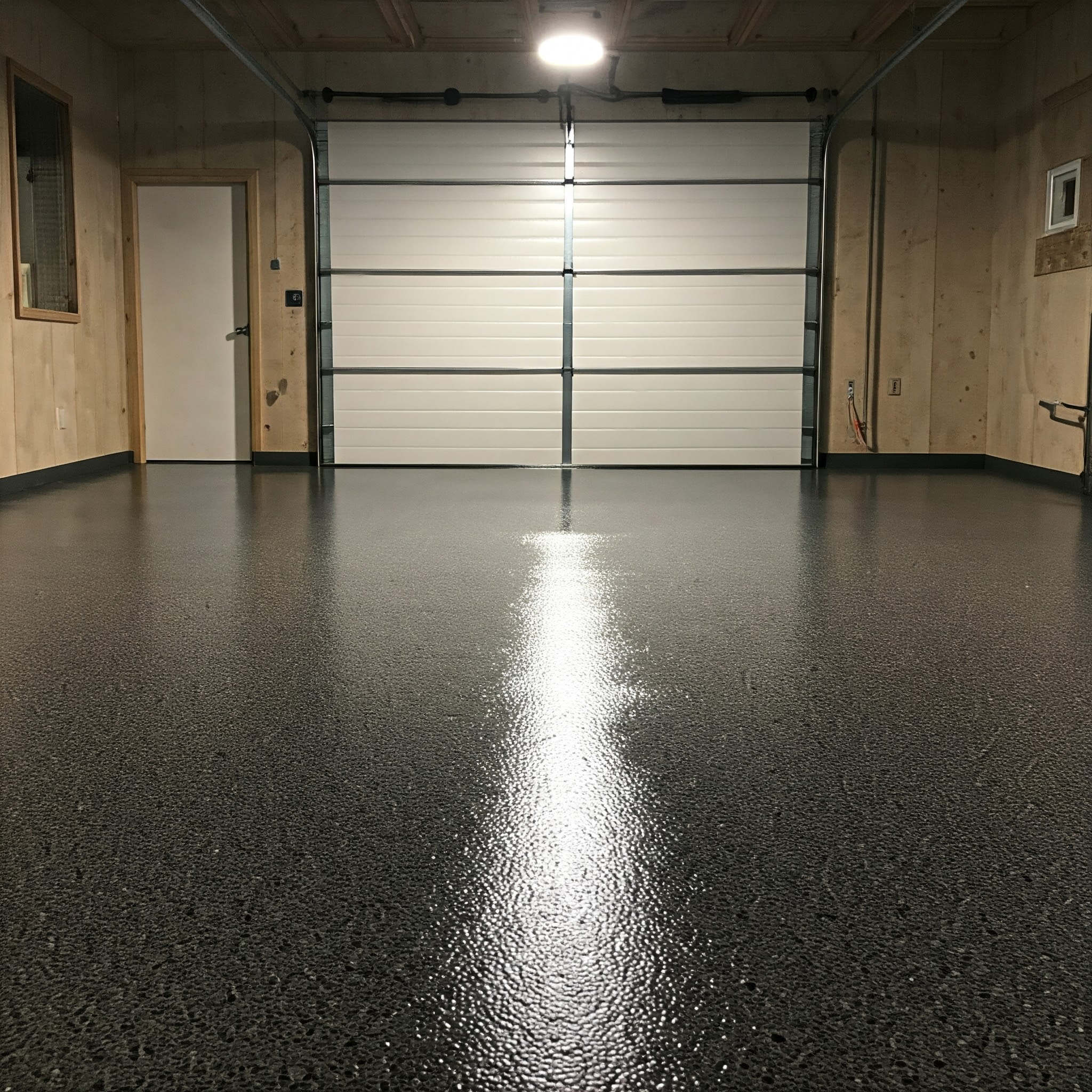Installing garage floor epoxy in cold climates requires careful planning and specialized techniques to ensure durability and long-lasting results. Cold temperatures can significantly impact the curing process, adhesion, and overall performance of the epoxy. Gresham Concrete Coatings specializes in epoxy installations tailored to challenging climates, providing weather-resistant solutions that stand the test of time.
Challenges of Installing Garage Floor Epoxy in Cold Climates
Epoxy coatings rely on a chemical reaction between resin and hardener to cure properly. Cold weather can disrupt this process, leading to:
- Extended Curing Times: Low temperatures slow down the chemical reaction, delaying curing.
- Poor Adhesion: Cold surfaces can hinder epoxy from bonding effectively to concrete.
- Surface Moisture Issues: Cold weather often brings increased humidity or condensation, which can affect the epoxy’s application.
- Brittle Results: If improperly cured, the epoxy may become brittle and prone to cracking under stress.
Understanding these challenges is the first step in overcoming them and ensuring a successful installation.
Special Considerations for Cold Climate Installations
| Feature | Cold Climate Epoxy Flooring | Standard Epoxy Flooring |
| Temperature Sensitivity | – Requires a controlled environment for proper curing.
– Specialized low-temperature formulas. |
– Standard epoxy may fail to cure properly in cold temperatures. |
| Curing Time | – Extended curing times due to colder temperatures (up to 72 hours or more). | – Normal curing time under standard conditions (typically 24-48 hours). |
| Surface Preparation | – Concrete may need to be warmed to ensure proper adhesion.
– Increased moisture management required. |
– Regular surface preparation (cleaning and grinding) is standard. |
| Adhesion | – Special care to maintain adhesion in cold conditions.
– Can require extra curing time for strong bonds. |
– Standard adhesion under normal conditions, but not recommended for cold. |
| Chemical Resistance | – Resists road salts, antifreeze, and other harsh winter chemicals. | – Standard epoxy resists some chemicals but may wear faster in extreme conditions. |
| Flexibility | – Flexes with cold weather and freeze-thaw cycles, reducing cracking. | – May become brittle in freezing temperatures without proper installation. |
| Moisture Resistance | – Enhanced resistance to moisture and freeze-thaw cycles, preventing damage. | – Less resistant to moisture buildup without proper precautions. |
| Installation | – Requires controlled temperature environment during installation.
– Use of heaters or insulation. |
– Easier to install in moderate conditions without temperature control. |
| Maintenance | – Regular cleaning to remove road salts and slush.
– Requires maintenance to prevent moisture buildup. |
– Standard cleaning with occasional resealing may be needed. |
| Cost | – Typically higher cost due to specialized products and additional measures. | – More affordable in non-extreme climates, no need for specialized products. |
Advantages of Epoxy Flooring in Cold Climates
Despite the challenges, epoxy flooring remains a top choice for garages in cold climates due to its durability and resilience. Key benefits include:
- Moisture Resistance: Protects concrete from freeze-thaw cycles, which can cause cracking and deterioration.
- Chemical Resistance: Withstands exposure to road salts, antifreeze, and other chemicals often found in winter environments.
- Easy Maintenance: Smooth, non-porous surfaces make it easy to clean slush, dirt, and debris brought in by vehicles.
- Improved Safety: Textured finishes enhance traction, reducing the risk of slips and falls in icy conditions.
How Gresham Concrete Coatings Ensures Success in Cold Climates
At Gresham Concrete Coatings, we have the expertise and tools to overcome the challenges of epoxy installation in cold climates. Our approach includes:
- Pre-Installation Assessments: Evaluating temperature, humidity, and surface moisture to plan for optimal results.
- Specialized Products: Using low-temperature epoxy formulas designed for cold-weather performance.
- Temperature Regulation: Employing heaters and insulation to create a controlled environment.
- Precise Application Techniques: Adjusting processes to ensure even curing and strong adhesion.
Frequently Asked Questions
1. Can epoxy be installed in freezing temperatures?
Epoxy cannot be applied in freezing temperatures without additional measures like space heaters. Specialized low-temperature formulas can be used in moderately cold conditions.
2. How do cold temperatures affect epoxy curing?
Cold temperatures slow down the curing process, which can result in tacky, improperly hardened epoxy if not managed correctly.
3. Can I use standard epoxy in a cold climate?
Standard epoxy is not recommended for cold climates. Low-temperature or high-solid formulas are better suited for these conditions.
4. How do I prepare my garage for epoxy installation in winter?
Ensure the garage is heated to the recommended temperature and the concrete surface is free from moisture or condensation.
5. How long does epoxy take to cure in cold weather?
Curing times in cold weather may extend to 72 hours or more, depending on the temperature and epoxy formula used.
6. Will epoxy flooring crack in cold climates?
Properly installed epoxy flooring will not crack in cold climates. Using a low-temperature formula and ensuring proper curing prevents brittleness.
7. Is epoxy flooring resistant to road salt?
Yes, epoxy flooring is resistant to road salts and other chemicals, making it ideal for garages in winter conditions.
8. What maintenance is required for epoxy floors in winter?
Regular cleaning to remove road salt and slush is essential. Use a mild detergent and a mop to maintain the floor’s finish.
9. Can epoxy floors be repaired in cold weather?
Yes, but repairs in cold weather require similar precautions as installation, such as temperature control and proper product selection.
10. Why choose Gresham Concrete Coatings for cold-climate epoxy installation?
Gresham Concrete Coatings has the expertise, specialized products, and tools to ensure durable, high-quality epoxy flooring in even the toughest climates.
Epoxy flooring is a practical, long-lasting solution for garages in cold climates, provided the installation is done correctly. Trust Gresham Concrete Coatings to deliver results that stand up to the challenges of winter weather. Contact us today to schedule a consultation and learn more about our cold-weather epoxy flooring solutions!

